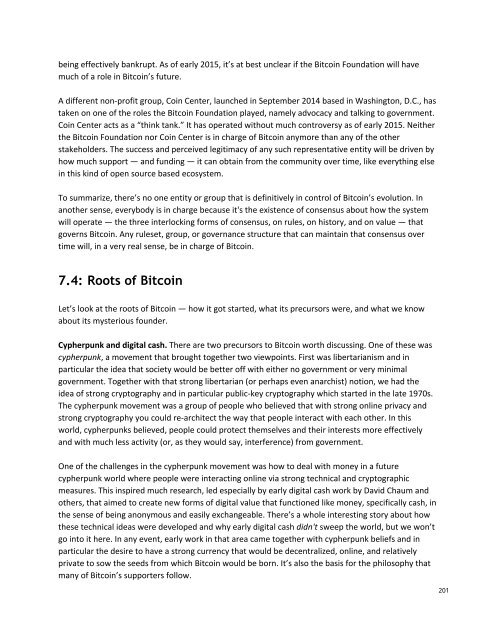Bitcoin and Cryptocurrency Technologies
1Qqc4BN
1Qqc4BN
Create successful ePaper yourself
Turn your PDF publications into a flip-book with our unique Google optimized e-Paper software.
eing effectively bankrupt. As of early 2015, it’s at best unclear if the <strong>Bitcoin</strong> Foundation will have<br />
much of a role in <strong>Bitcoin</strong>’s future.<br />
A different non‐profit group, Coin Center, launched in September 2014 based in Washington, D.C., has<br />
taken on one of the roles the <strong>Bitcoin</strong> Foundation played, namely advocacy <strong>and</strong> talking to government.<br />
Coin Center acts as a “think tank.” It has operated without much controversy as of early 2015. Neither<br />
the <strong>Bitcoin</strong> Foundation nor Coin Center is in charge of <strong>Bitcoin</strong> anymore than any of the other<br />
stakeholders. The success <strong>and</strong> perceived legitimacy of any such representative entity will be driven by<br />
how much support — <strong>and</strong> funding — it can obtain from the community over time, like everything else<br />
in this kind of open source based ecosystem.<br />
To summarize, there’s no one entity or group that is definitively in control of <strong>Bitcoin</strong>’s evolution. In<br />
another sense, everybody is in charge because it's the existence of consensus about how the system<br />
will operate — the three interlocking forms of consensus, on rules, on history, <strong>and</strong> on value — that<br />
governs <strong>Bitcoin</strong>. Any ruleset, group, or governance structure that can maintain that consensus over<br />
time will, in a very real sense, be in charge of <strong>Bitcoin</strong>.<br />
7.4: Roots of <strong>Bitcoin</strong><br />
Let’s look at the roots of <strong>Bitcoin</strong> — how it got started, what its precursors were, <strong>and</strong> what we know<br />
about its mysterious founder.<br />
Cypherpunk <strong>and</strong> digital cash.There are two precursors to <strong>Bitcoin</strong> worth discussing. One of these was<br />
cypherpunk, a movement that brought together two viewpoints. First was libertarianism <strong>and</strong> in<br />
particular the idea that society would be better off with either no government or very minimal<br />
government. Together with that strong libertarian (or perhaps even anarchist) notion, we had the<br />
idea of strong cryptography <strong>and</strong> in particular public‐key cryptography which started in the late 1970s.<br />
The cypherpunk movement was a group of people who believed that with strong online privacy <strong>and</strong><br />
strong cryptography you could re‐architect the way that people interact with each other. In this<br />
world, cypherpunks believed, people could protect themselves <strong>and</strong> their interests more effectively<br />
<strong>and</strong> with much less activity (or, as they would say, interference) from government.<br />
One of the challenges in the cypherpunk movement was how to deal with money in a future<br />
cypherpunk world where people were interacting online via strong technical <strong>and</strong> cryptographic<br />
measures. This inspired much research, led especially by early digital cash work by David Chaum <strong>and</strong><br />
others, that aimed to create new forms of digital value that functioned like money, specifically cash, in<br />
the sense of being anonymous <strong>and</strong> easily exchangeable. There’s a whole interesting story about how<br />
these technical ideas were developed <strong>and</strong> why early digital cash didn'tsweep the world, but we won’t<br />
go into it here. In any event, early work in that area came together with cypherpunk beliefs <strong>and</strong> in<br />
particular the desire to have a strong currency that would be decentralized, online, <strong>and</strong> relatively<br />
private to sow the seeds from which <strong>Bitcoin</strong> would be born. It’s also the basis for the philosophy that<br />
many of <strong>Bitcoin</strong>’s supporters follow.<br />
201









